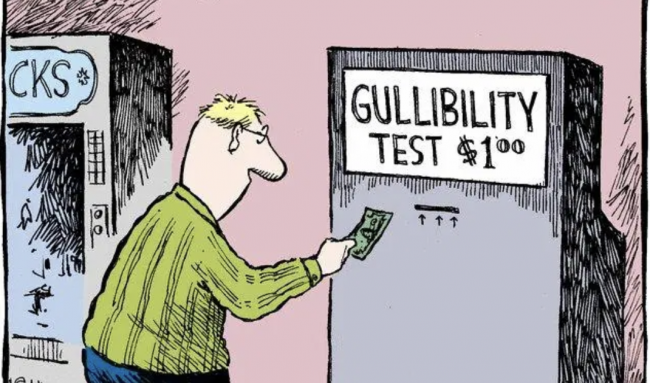September 13, 2020, Daniel Miessler
I think we’ve lost the plot on disinformation. It’s not the attacks that are the problem. It’s the fact that too many Americans are willing to believe almost anything.
Ideally we’d reduce both the attacks and the vulnerability.
Of course it would be nice to have fewer attacks. Of course it would be nice to keep attacks from being used against higher numbers of vulnerable people. But ultimately the problem is the vulnerability itself.
Bad ideas are worse than bad code because they’re naturally contagious.
This is easier to see in the information security world. If you have a target that will run any code that it’s given, you cannot spend all of your energy making sure it doesn’t receive any code. Part of your plan has to be making sure it’s not so eager to do so. We call that patching.
It’s the same with people. We need to do more than control bad ideas; we need to patch our population against them.
Trade school doesn’t immunize against specious ideas.
For people, patching means education. And not the worker-prep kind of education where you learn how to be an obedient and productive office worker, but the kind that teaches the fundamentals of how things work—from physics to psychology, and from physiology to philosophy.
MORE: https://danielmiessler.com/blog/our-real-weakness-is-gullibility-not-disinformation
“It’s the fact that too many Americans are willing to believe almost anything.”
My dad is a Magoo and watches mostly fox news for his daily disinformation.
He also loves, and believes, the show skinwalker ranch about aliens and he believes all the ancient aliens stuff, arguing about “laser cut stones” and stuff like the Nazca lines…
Yeah he’s gullible all right. I just wish I was able to trick him into not believing Sean Hannity for once…
And Anthropology. Culture is “personality writ large”.
The problem being that education is slow, inconsistent and not terribly effective when you cant drop the people who dont/wont pass.
The problem is that schools no longer teach Critical Thinking Skills, which help people recognize and reject propaganda. Republicans have even openly disparaged Critical Thinking Skills, and their gullible followers go aling with it, and parrot it.
If schools used to teach critical thinking skills effectively then older people should be more resistant to disinformation, not less. Since that is not the case we must conclude what they were teaching before was not effective against this threat.
They did teach Critical Thinking Skills back then, but students back then were EXACTLY like students today. Some are smart, and it sticks, some are stupid, and it doesn’t, and most are in between, with mixed results. Some get it, and some don’t. Then there are those with good Critical Thinking Skills, who choose to use them to commit evil. That seems to be common among politicians and business people. They often seem to believe their own propaganda, but they know better, they are just selling it to the rubes, who weren’t trained in school to use their brains properly.
Instead of thinking about age, think about educational level. Studies have shown that the more education a person gets, the more liberal they tend to be. College grads are more liberal than HS grads, Masters grads are more liberal, and PhDs, are even more liberal. The more intelligent a person gets, the more they reject illogical and/or disproven conservative propaganda.
The difference between yesterday and today, is that current Conservatives are actively trying to avoid teaching Critical Thinking Skills that give future adult citizens the tools to question and reject their propaganda. In 2012, Texas Republicans even added it to their official party platform:
They literally said that they don’t want students learning to think for themselves, and “undermining parental authority.” So how are they supposed to become parents themselves someday? Will they always have to consult with their old parents on everything (who, ironically, were educated when Critical Thinking Skills weren’t literally banned in schools).
The answer, of course, is that they don’t give a rat’s ass about parental authority, they just don’t want the next generation growing up to question their POLITICAL authority.
Imagine opposing something that they themselves call “Higher Order Thinking Skills?” Why would you not want every citizen of your country thinking on a higher level, unless you prefer a stupid nation over an intelligent one? And why would that be? The only possible answet is because stupid citizens are far easier to manipulate.
Also remember that Texas is such a huge state, and buys so many textbooks, that most textbook companies write their textbooks to be acceptable in Texas. That means that textbooks will avoid any use of Critical Thinking to appease Texas, but then schools all over America will be using those same intellectually compromised textbooks.
The problem being that education is slow, inconsistent and not terribly effective when you cant drop the people who dont/wont pass.
Drop from what, school? People don’t learn from schools in USA, they learn from HDTV Fox News, they learn from Reddit, Twitter, Bluesky, Alex Jones, podcasts, Joe Rogan, cinema, sports stars, TikTok, TV entertainment, video games, etc.
Adults over age 24 do all their learning and study on social media and junk news networks.
Thats what I mean. If you put 100 people in a classroom, teach them something, and then filter out all the people who didnt learn anything youll be left with a pool of people who have been effectively educated. That works great if you are trying to create an educated class of professionals with specific skills and knowledge. However, if you are trying to improve the education level of society as a whole you are still stuck with all the people who cant or wont learn. You end up with training thats about as effective as a mandatory slide show, which is maybe better than nothing, but also not very good.
Preaching to the choir here. We have a world full of Wikipedia and we could put every HowTo on a Wiki, but we rather suck down Rupert Murdoch and Elon Musk bullshit, “Trickle Down Garbage” from Disney. Wealth televangelism networks.
“Public education does not serve a public. It creates a public. And in creating the right kind of public, the schools contribute toward strengthening the spiritual basis of the American Creed. That is how Jefferson understood it, how Horace Mann understood it, how John Dewey understood it, and in fact, there is no other way to understand it. The question is not, Does or doesn’t public schooling create a public? The question is, What kind of public does it create? A conglomerate of self-indulgent consumers? Angry, soulless, directionless masses? Indifferent, confused citizens? Or a public imbued with confidence, a sense of purpose, a respect for learning, and tolerance? The answer to this question has nothing whatever to do with computers, with testing, with teacher accountability, with class size, and with the other details of managing schools. The right answer depends on two things, and two things alone: the existence of shared narratives and the capacity of such narratives to provide an inspired reason for schooling.” ― Neil Postman, The End of Education: Redefining the Value of School, 1995





